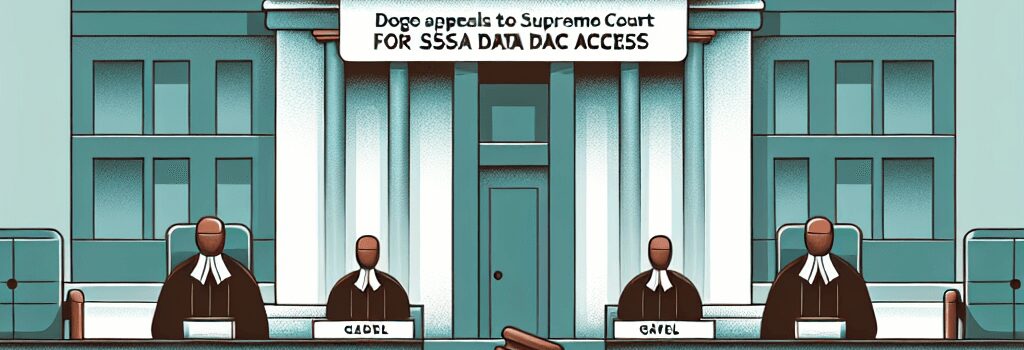DOGE Appeals to Supreme Court for SSA Data Access

On May 5, 2025, the Trump administration filed an emergency application with the Supreme Court seeking to overturn two adverse rulings that barred the Department of Government Efficiency (DOGE) from accessing Social Security Administration (SSA) records. The Solicitor General, John Sauer, argues that the injunction inflicts “irreparable harm” on the Executive Branch’s mission to modernize its IT infrastructure and eliminate waste, fraud, and abuse across federal programs.
Court Battles and Supreme Court Appeal
To date, DOGE has suffered two major losses:
- March 2025: US District Judge Ellen Lipton Hollander granted a preliminary injunction preventing SSA from sharing non-anonymized personally identifiable information (PII) with DOGE. The judge criticized the agency’s “fishing expedition” approach and ordered deletion of all non-anonymized records already transferred.
- April 2025: The US Court of Appeals for the Fourth Circuit denied the Trump administration’s emergency motion to stay the district court’s order by a 9–6 vote. The majority—judges appointed by Democratic presidents—found that DOGE’s objectives could be achieved using anonymized or redacted datasets under existing SSA protocols.
In its Supreme Court filing (docket No. 24Axxx), the Solicitor General contends that both lower courts overstepped their authority under the Privacy Act of 1974, which permits agencies to share records with any officer who has a legitimate “need to know.” The brief emphasizes that DOGE team members are bound by the same confidentiality and ethical standards as career SSA employees.
Technical Implementation of the SSA–DOGE Data Pipeline
DOGE’s proposed data pipeline relies on a zero-trust architecture and end-to-end encryption. Key technical specifications include:
- Data Encryption: All PII is encrypted at rest and in transit using AES-256 with FIPS 140-2 validated modules.
- Access Controls: Role-based access control (RBAC) and attribute-based access control (ABAC) enforced via NIST SP 800-53 Rev. 5 control families (AC-2, AC-3, AC-6).
- Audit Logging: Immutable, time-stamped logs stored in an append-only ledger, with real-time anomaly detection using SIEM (Security Information and Event Management) tools.
- Data Segmentation: PII fields are tokenized, with full data available only to staff who have passed background investigations and specific training modules under the Federal Information Security Modernization Act (FISMA).
Despite these safeguards, Judge Hollander found in her March opinion that DOGE affiliates lacked the necessary need to know and had not undergone standard hiring and background‐check processes required for SSA personnel.
Privacy and Security Controls: Standards and Best Practices
Industry experts note that government agencies typically adopt a layered security model:
- Multi-Factor Authentication (MFA) for all remote access, compliant with OMB Memorandum M-22-09.
- Continuous monitoring of user behavior through User and Entity Behavior Analytics (UEBA).
- Data minimization and anonymization: Reducing PII exposure by employing differential privacy techniques and k-anonymity frameworks.
- Regular third-party penetration testing and red team exercises to validate controls.
Dr. Lena Ortiz, Chief Data Officer at a leading cybersecurity consultancy, commented: “Agencies can safely share sensitive information only when they implement strict compartmentalization and continuous validation of every access request. Without that, even encrypted systems can be vulnerable to insider threats.”
Legal Precedents and Implications for Data Governance
Legal analysts point to two significant precedents that bear on this case:
- Department of Justice v. Landano (1993): Established deferral of Privacy Act claims when disclosure serves investigative purposes, but stressed case-by-case balancing.
- NASA v. Nelson (2011): Upheld background checks and security clearances for federal contractors accessing personal data, underscoring the government’s interest in safeguarding citizen privacy.
Professor Rachel Klein of Georgetown Law observes, “The Supreme Court’s decision could redefine the scope of executive authority over data sharing within the federal government—and clarify how Privacy Act exceptions apply to modern data analytics initiatives.”
Expert Opinions and Future Outlook
If the Supreme Court grants the stay, DOGE may resume its planned integrations with SSA’s legacy systems, including COBOL-based mainframes and new API gateways built on RESTful microservices in a secure government cloud (FedRAMP High). That would allow for near real-time fraud detection using machine learning models hosted in hybrid environments.
However, if the injunction is upheld, agencies will likely double down on anonymization and workarounds that avoid sharing raw PII, potentially delaying AI-driven efficiency projects by months or years. According to an internal White House memo obtained by The Washington Post, the administration views this as a critical test case for its broader digital transformation agenda.
The Supreme Court is expected to decide by late May whether to grant or deny the emergency application. A ruling one way or the other will have far-reaching consequences for data governance, privacy law, and the future of federal cybersecurity initiatives.